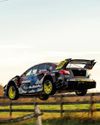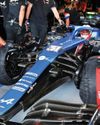
Q Regarding the question about in-wheel motors in Racecar Engineering issue V31N11, I was surprised not to see any mention of torque vectoring with hub motors. Or was this in the catch all about making vehicles go directions other than where they are pointed?
When you mix performance vehicle dynamics and hub motors, independent control of the motors is the first thing that crosses my mind. This may be as simple as using software to link the speed of two wheels together, rather than a set of clutch discs. Once you do it in software, it can be cognisant of the yaw rate of the vehicle. Obviously, this is more of a challenge with a conventional limited slip.
THE CONSULTANT
A That was a significant oversight on my part. Yes, having a separate motor for each wheel does open up interesting possibilities for generating yaw moments by applying unequal power to the right and left wheels, in addition to steering them individually. Of course, it is not necessary for this to occur that the motors be hub motors. They could be sprung. There just has to be one motor for each wheel, or at least one for each side of the car.
The control strategy for such a feature, or combination of features, really poses some puzzles. It's more complex than thrust vectoring for an aircraft, for example. Near the limit of adhesion, the relationship between torque applied and ground plane force produced is complex and non-linear, and longitudinal force capability plays off against lateral force capability.
If you are directing the exhaust gases of a jet or rocket engine, you can be pretty sure that more fuel to the engine will result in more reactive propulsion opposite the direction of the discharge. The relationship may be somewhat non-linear, but it doesn't reverse.
Denne historien er fra December 2021-utgaven av Racecar Engineering.
Start din 7-dagers gratis prøveperiode på Magzter GOLD for å få tilgang til tusenvis av utvalgte premiumhistorier og 9000+ magasiner og aviser.
Allerede abonnent ? Logg på
Denne historien er fra December 2021-utgaven av Racecar Engineering.
Start din 7-dagers gratis prøveperiode på Magzter GOLD for å få tilgang til tusenvis av utvalgte premiumhistorier og 9000+ magasiner og aviser.
Allerede abonnent? Logg på
Talk the torque
More thoughts on in-wheel motors and their effects on twisting force
Rolling about
An explanation of the limitations of a previous load transfer article, bringing jacking forces into the mix
F1 breaks schedule records
The FIA has confirmed no fewer than 23 races on the 2022 Formula 1 World Championship schedule, the highest number of grands prix ever to be held in a single season, and that has led to criticism from some teams that will be on the road for eight months.

Under pressure
Toyota may have finished first and second at Le Mans this year, but the effort required to overcome a fuel delivery problem and finish with both cars was Herculean
Physics at work
Dutch company, Intrax, offers Racecar Engineering an insight into the technologies it employs to optimise its suspension products
Williams' 2030 ambition
Williams Racing has committed to becoming climate positive by 2030 as part of an all-new sustainability strategy.
Diff'rent strokes
Racecar looks at the different types of mechanical differential, their benefits and limitations
Das Boot
A curious Twitter exchange fired up a unique, hydrogen-powered, cross-country project that will contest the Baja 1000 in November 2022

Air born
Every racecar engineer's dream is a blank sheet of paper design. When Hoonigan and Subaru approached Vermont Sportscars about building the next generation of Gymkhana racer, that's just what the company was given

Remote control
Called variously ‘virtual garages’, ‘mission control’ or ‘race support rooms’ is the future of race engineering sitting in the warm back at HQ?